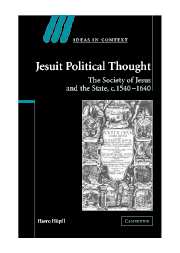Book contents
- Front Matter
- Contents
- Acknowledgements
- List of abbreviations
- Translations, references, and orthography
- Introduction
- 1 The character of the Society of Jesus
- 2 The Society's organisational ideas
- 3 The Society and political matters
- 4 The Church, the Society, and heresy
- 5 The confrontation with reason of state
- 6 Reason of state and religious uniformity
- 7 Jesuit reason of state and fides
- 8 Reason of state, prudence, and the academic curriculum
- 9 The theory of political authority
- 10 Limited government, compacts, and states of nature
- 11 The theory of law
- 12 The common good and individual rights
- 13 Tyrannicide, the Oath of Allegiance controversy, and the assassination of Henri IV
- 14 The papal potestas indirecta
- Conclusion
- Bibliography
- Index
- IDEAS IN CONTEXT
Conclusion
Published online by Cambridge University Press: 22 September 2009
- Front Matter
- Contents
- Acknowledgements
- List of abbreviations
- Translations, references, and orthography
- Introduction
- 1 The character of the Society of Jesus
- 2 The Society's organisational ideas
- 3 The Society and political matters
- 4 The Church, the Society, and heresy
- 5 The confrontation with reason of state
- 6 Reason of state and religious uniformity
- 7 Jesuit reason of state and fides
- 8 Reason of state, prudence, and the academic curriculum
- 9 The theory of political authority
- 10 Limited government, compacts, and states of nature
- 11 The theory of law
- 12 The common good and individual rights
- 13 Tyrannicide, the Oath of Allegiance controversy, and the assassination of Henri IV
- 14 The papal potestas indirecta
- Conclusion
- Bibliography
- Index
- IDEAS IN CONTEXT
Summary
By the early seventeenth century, the Society of Jesus had thus come to occupy a most peculiar status in the public world. It had numerous and powerful friends and patrons, but also many bitter and vociferous enemies. The latter comprised not only ‘heretics’, whose hostility Jesuits could reckon a badge of honour, but also Catholics who in most respects were orthodox enough. The enmity the Society aroused cannot be ascribed principally to its outstanding role in the Counter-Reformation. It derived largely from the actual political engagement of the Society, and the suspicion of some deep political strategy which its enemies discerned in everything that Jesuits did.
This book has attempted to delineate what Jesuits in fact taught and thought about true political doctrine and right political practice. What emerged was of course not a comprehensive political doctrine to which Jesuits were required to subscribe as a condition of membership, as if the Society of Jesus was some particularly doctrinaire political party. Indeed, the embattled state of the Society absolutely precluded an exclusively Jesuit doctrine on anything, and demanded the use of loci communes with maximal appeal. As often as not, moreover, Jesuits simply taught what was conventional in their current line of academic work and avoided controversy. All the same, much of what they wrote on politics was not merely contingently related to the activities and beliefs of the Society, and it was rarely merely the expression of some individual Jesuit's point of view.
- Type
- Chapter
- Information
- Jesuit Political ThoughtThe Society of Jesus and the State, c.1540–1630, pp. 366 - 376Publisher: Cambridge University PressPrint publication year: 2004



